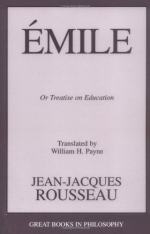
|
| Name: _________________________ | Period: ___________________ |
This test consists of 15 multiple choice questions and 5 short answer questions.
Multiple Choice Questions
1. How did the man to whom Rousseau was apprenticed treat Rousseau?
(a) Dispassionately.
(b) Affectionately.
(c) Gently.
(d) Violently.
2. What is Rousseau's focus in Chapter 1, Book 3?
(a) Innocence and experience.
(b) Knowledge and ignorance.
(c) Weakness and strength.
(d) Truth and falsehood.
3. What does Rousseau say an adolescent's new powers and experiences cause him or her to do?
(a) Discover new laws.
(b) Speak with new authority.
(c) Chafe against constraints.
(d) Submit to authorities.
4. What does Rousseau say is new for adolescents?
(a) Knowledge and fear.
(b) Perception and judgment.
(c) Passions and humility.
(d) Desire and family.
5. Whom does Rousseau address directly in the section on submission?
(a) Gentlemen.
(b) Tutors.
(c) Clergy.
(d) Mothers.
6. What does Rousseau say supplies the greatest motivational force for a student?
(a) Threat of punishment.
(b) Promise of reward.
(c) Fear of humiliation
(d) Interest.
7. Who begins to have an influence on the child after the mother has weaned the boy?
(a) The siblings.
(b) The nanny.
(c) The tutor.
(d) God.
8. What does the field of epistemology concern itself with?
(a) The realities behind the appearances we can see and measure.
(b) How we know what we know.
(c) The ideal forms behind the reality we experience.
(d) The study of correspondence.
9. What kind of opinions does Rousseau seem to hold, as he talks about book learning?
(a) Anti-intellectual.
(b) Devotional.
(c) Skeptical.
(d) Reverential.
10. Who should have the power in a family?
(a) The nanny.
(b) The child.
(c) The parents.
(d) God.
11. What additional factor allows a child to exceed his limits?
(a) The child's education.
(b) The child's geographical location.
(c) The child's culture.
(d) The child's temperament.
12. Rousseau contrasts book learning with what kind of learning?
(a) Hands-on learning.
(b) Learning from dictation.
(c) Learning from competition.
(d) Learning from watching.
13. What kind of background does Rousseau say he came from?
(a) Openly sensual.
(b) Libertine.
(c) Chaste.
(d) Conservative.
14. What is the customary view of children, according to Rousseau?
(a) That they are angels.
(b) That they are devilish.
(c) That they are weak.
(d) That they are raw material.
15. How does Rousseau answer Emile's question about where babies come from?
(a) In explicit detail.
(b) He refuses to answer the question until Emile is older.
(c) Without describing sexual activity but without being deceitful.
(d) In polite euphemisms.
Short Answer Questions
1. When does Rousseau say manhood begins?
2. How does Rousseau believe physical activity affects perception?
3. What does Rousseau say changes the effects of women on young men?
4. What does Rousseau urge people to avoid?
5. What does Rousseau recommend mothers should give up?
|
This section contains 428 words (approx. 2 pages at 300 words per page) |

|




